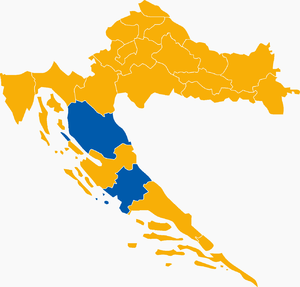Croatian presidential election, 2005
|
|
|||||||||||||||||
|---|---|---|---|---|---|---|---|---|---|---|---|---|---|---|---|---|---|
|
|||||||||||||||||
| Turnout | 50.57% (first round) 51.04% (second round) |
||||||||||||||||
|
|||||||||||||||||

Results of the second round in all of Croatia's counties: the candidate with the majority of votes in each administrative division.
Stjepan Mesić Jadranka Kosor |
|||||||||||||||||
|
|||||||||||||||||
Presidential elections in Croatia took place in two rounds in January 2005. This was the fourth such election since independence in 1991. It was the first presidential election held after the constitutional changes of November 2000, which replaced a semi-presidential system with an incomplete parliamentary system, thus greatly reducing the powers of the President in favor of the Prime Minister and his government cabinet. The incumbent president Stjepan Mesić, who had been elected in the 2000 election as the candidate of the Croatian People's Party, was eligible to seek reelection to a second term and ran as an independent because the Constitution of Croatia prohibits the President from holding party membership while in office.
The election resulted in the landslide re-election of incumbent President Stjepan Mesić, in office since 2000, to a second five-year term. It also became the first time that a woman, HDZ candidate Jadranka Kosor, took part in the runoff. The percentage of the vote received by Mesić in the second round is the highest of any president to date, as he won re-election with 65.93% of the vote, while also narrowly failing to win outright in the first round, receiving 48.92% of votes. Namely, Mesić had indeed received an absolute majority of the votes cast within Croatia itself, but the votes of Croatian citizens living abroad forced a run-off by making Mesić's percentage of the vote fall just under the necessary 50% + 1 vote threshold needed to win in the first round. Voter turnout was 50,57% in the first round and 51,04% in the second round. The first round exhibited a decline of 450.500 votes when compared to the first round of the previous election in 2000 and a 362.000 vote decline in comparison with the second round of the same election. On the other hand, the second round of this election exhibited a 435.000 vote decline in comparison with the first round of the 2000 election and a 347.000 vote decline in comparison with the second round of the same election.
...
Wikipedia


